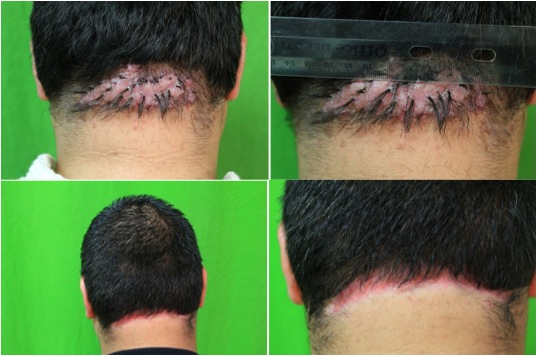You may have noticed something that looks like razor bumps on the back of your head, or pimples on the back of your head. If you are an African American male who typically wears your hair short, this may be acne keloidalis nuchae.
What Does Acne Keloidalis Nuchae Look Like?
You will know that you have acne keloidalis nuchae when these razor bumps on the back of your head continue growing in size and discomfort. Acne keloidalis nuchaea ultimately develops into tumsescent plaques filled with malodorous puss, between which grow disjointed tufts of hair. These keloid-like growths are often painful and itchy, and can ooze discharge. More than anything, though, they are cosmetically disfiguring and embarrassing for the sufferer.
While it is most common amongst African Americans, it is occasionally present in Asians and Hispanics. Very rarely does it affect Caucasians. And amid this breakdown, the ratio of men to women who develop acne keloidalis nuchae is 20 to one.
How Did I Get Acne Keloidalis Nuchae?
The origin of AKN is not fully known, however researchers hypothesize that it is caused or exacerbated by a number of things, including:
- -Autoimmune dysfunction, wherein the body thinks the hair follicle is an invader and attacks the shaft and adjoining sebaceous gland. The fact that AKN is most highly present among people with curled hair follicles leads researchers to believe that ingrown hairs contribute to this cause by prompting an inflammatory autoimmune response to the buried hair.
- -Frequent rubbing or friction against the occipital scalp may lead to more ingrown hairs and worsen the autoimmune response. This may include frequent shaving of the head or rubbing of a shirt collar against the head.
- -An excess of mast cells may also cause an autoimmune flare up.
- -Bacteria damaging the hair follicle.
- -The use of Cyclosporine, a medication that restrains the immune system for the purpose of organ transplant, increases the occurrence of AKN in Caucasians.
Treatment for Acne Keloidalis Nuchae
This disorder is a chronic condition and will not go away on its own. It often requires aggressive to treatments, which may include:
- -Topical steroids
- -Oral steroids
- -Corticosteroid injections
- -Surgical removal

